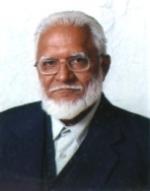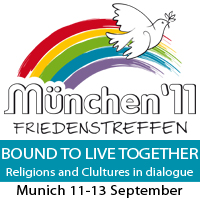
Supreme Court, Pakistan
|
Let me first of all thank Community of Sant’Egidio for giving me the honor to be part of this august International Meeting for Peace. I feel deeply humbled in the presence of great theologians and philosophers speaking on a subject that requires more competence than I can claim. All of us share and support the idea of coexistence but at the same time we find it quite hard translating it into reality. I believe we are now more than ever in need of exploring how we can pave the grounds for peaceful coexistence. Very respectfully I submit that our search for grounds for coexistence must start from revisiting our tools of thought in this quest.
Peaceful existence, promised by all religions, philosophers, humanists and rationalists is still a poet’s dream. It is because we are still thinking in terms of empires, security, and conflict. We still believe in war as a method of solving conflicts. Consequently, humanity continues to suffer from the nightmares of terrorism, jingoism, and destructive wars. Science and technology are still serving the industries producing weapons of mass destruction, causing environmental degradation and widening the gap between the rich and the poor. Human beings still discriminate, hate, and kill each other in the name of religion, state, and security. Plurality and differences are considered a threat, and multiculturalism is discredited in favor of integration. Religious minorities continue to be intimidated. Caricatures of the founders of religion are promoted as expressions of freedom. Minarets and Niqab strike fear and intolerance is attributed to the univocal and unchanging nature of religious systems. It is intimidating in this environment to speak about searching for grounds of coexistence.
This search is complicated also by the fact that we cannot limit our inquiry to religious coexistence; we must speak about coexistence at large. Recent debates about coexistence point to the fact that it is not a straightforward inquiry into theology or politics. It points to multiple factors including the current epistemological crisis and the latest concerns about communicavity for building consensus. That is why the concept looks paradoxical: Coexistence is inevitable but and elusive simultaneously.
It is gratifying that in recent years representatives of almost all religions have stressed the need for religious coexistence declaring that their respective scriptures regard peace and peaceful coexistence as one of the major themes of their teachings Even those who blame religion for violence also believe that peaceful coexistence is inevitable. Even if contradictory, these debates suggest peaceful coexistence as common ground not only among the believers but also between them and non-believers. All agree that peaceful existence is not simply a wish and a dream it is a necessity. The course of history, economic developments, instant access to all sort of information all have brought humans close to each other, often too close for comfort. We are bound together more than ever but we are either restive or slow in getting used to it.
Searching for grounds for coexistence is therefore also an inquiry into the causes of our reluctance to coexistence. In my view this reluctance is caused by the theological and scientific constructions of truth and existence. We feel comfortable with familiar constructions of truths. Coexistence conjures up fears of accepting and tolerating unfamiliar constructions of reality. Such images of coexistence pose threat to the very existence of our identities and existence. This fear has its origins in our binary categories of thought.
We are almost daily discovering that phenomena of universe point to plurality, diversity and multiplicity and our binary tools of thought fail to put them into the simple two categories of yes and know, right and wrong or good and bad. Not perhaps because truth is relative but also because a large number of these phenomena belong to the category called ‘do not know’. The irony is that more our knowledge advances the more we have to admit how little we know. Not that we should, therefore, stop seeking knowledge and be content with what we have, but that we should always be conscious of the limits of our knowledge. In my view, admission of limited knowledge could be one ground of coexistence.
It means that our reading and understanding of scriptures, theology, and religious laws are human constructions and therefore have their limits. Problem arises when these human constructions are believed and communicated as Divine truths. The believer is perplexed when he or she finds them contrary to contemporary information. The theologian and the scientist both can live peacefully if they admit the limit of human knowledge. It is perhaps easier for a theologian because he or she is ready to distinguish between Divine and human knowledge. But no one is more aware of the limits of knowledge than the modern scientist and researcher. Bound together in their conscience of limit of knowledge all of them can work for peaceful human existence.
Acknowledgement of one’s limits can also pave the way for appreciating and respecting the differences, diversity, plurality, and multiplicity in human thought and cultures, which I propose as the second ground for coexistence. Limited perspectives produce divergent views of reality. These limitations are epistemological but are also informed by different local, social, religious, psychological experiences. One cannot dismiss these differences as untruth. They are human constructs. It is living together and through dialogue, discourse and sharing experience that we come to know other perspectives. We may not agree on one perception but we may admit our limit and appreciating diversity we may find grounds for coexistence. The variety and diversity are the signs of God in the creation of the universe, the heavens, and the earth. According to the Qur’an, those who behold the diversity in human tongues and colors witness the signs of God and are blessed with expansive knowledge. Differences are caused by limited knowledge but that is characteristic of our life in this world, which is ever unfolding itself. The humans must continuously struggle in the pursuit of knowledge and for common good. No one can claim the end of knowledge. Humans can coexist better recognizing their limits and respecting the differences.
To conclude, let me recite a verse from the Qur’an:
And if God had so willed, He could surely have made you all one single community: but in order to test you by means of what he has vouchsafed unto you [He willed it otherwise.] Vie, then, with one another in doing good works. Unto God you must return; and then He will make you truly understand all that on which you were wont to differ (5: 48).
|

